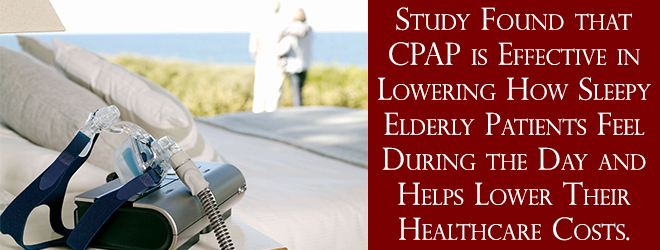Jack Benny, the late great comedian, once said: “Age is strictly a case of mind over matter. If you don’t mind, it doesn’t matter.” It’s true, when you reach retirement age – it’s like entering permanent vacation mode, which means no more Monday mornings, time clocks, deadlines. Sounds like a dream, right? The only real downside is that your body can’t quite keep up with this new lease on life. This is especially the case if you are a senior and have obstructive sleep apnea, which can reduce quality of life and worsen a number of preexisting conditions. Fortunately, though, a new study shows that CPAP treatment is effective in treating sleep apnea in older adults.

Until now, there hasn’t been a clinical study that explores both the health benefits and cost benefits of treating older people with CPAP for obstructive sleep apnea. Why is grandpa breathing funny in his sleep? – Don’t bother grandpa. This was the pervading thought process about older people and breathing difficulties until a bunch of researchers at the Imperial College of London got together (they had tea and had crumpets first, most likely) and decided to find out if CPAP treatment would be beneficial and maybe even save a few older people’s lives.
People who reach senior age are already showing signs of some physical and mental decline. Driving becomes more difficult because of diminished acuity and sleepiness. The ol’ ticker starts to slow down a little bit. And cancer, stroke and other serious health conditions become a real threat. Throw in obstructive sleep apnea and you can worsen or bring all these conditions to a head. For the study, researchers brought in 278 individuals over the age of 65. Over the course of twelve months, they were monitored and observed. Scientists looked at everything – from quality of life to mood to accidents and even cardiovascular risk factors.
The results: in older adults with obstructive sleep apnea, regular CPAP treatment reduces sleepiness and increases quality of life. For some patients, systolic blood pressure fell. In other patients, it reduced healthcare costs. All in all, the researchers recommend that CPAP “should be offered routinely to older patients with OSA syndrome.” – Pretty strong words from a bunch of scientists with English accents. In all seriousness, though, this was the first study of its kind and its results are confounding evidence that CPAP doesn’t only provide relief for people who are middle aged – it also works for seniors too.
In the end, if you are a senior over the age of 65 and you are holding out on CPAP treatment, this study should be the evidence you need to finally purchase a CPAP system and mask. It’s time to get serious about sleep apnea and all its hidden dangers. Just because you are a senior, it doesn’t mean that you have to feel like a senior. When it comes down to it, dedicated nightly CPAP treatment could be your secret weapon for sticking around for a couple more decades. In the end, age may be a case of mind over matter, but obstructive sleep apnea is definitely not.
Source: “Continuous Positive Airway Pressure Effective in Treating Sleep Apnea in Older Adults.” Benita Matilda – Science World Report. August 27, 2014.









